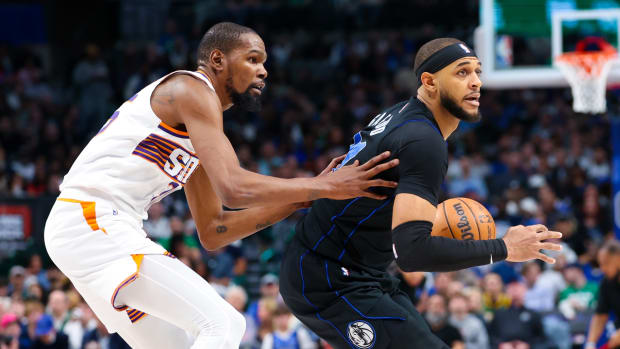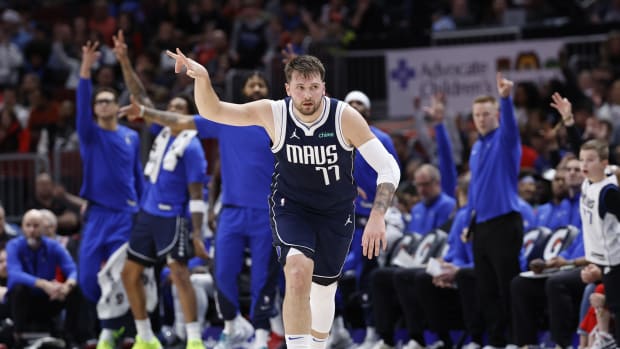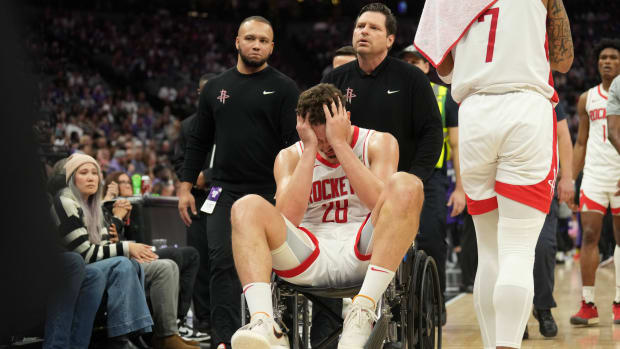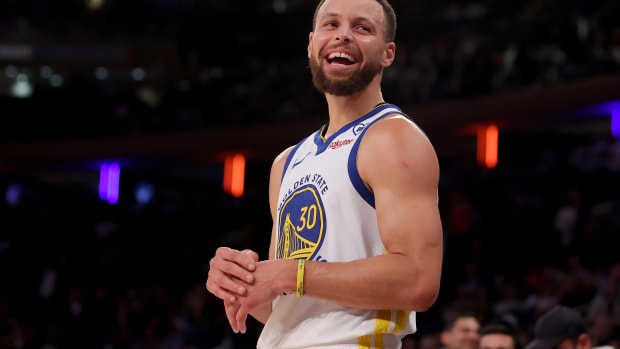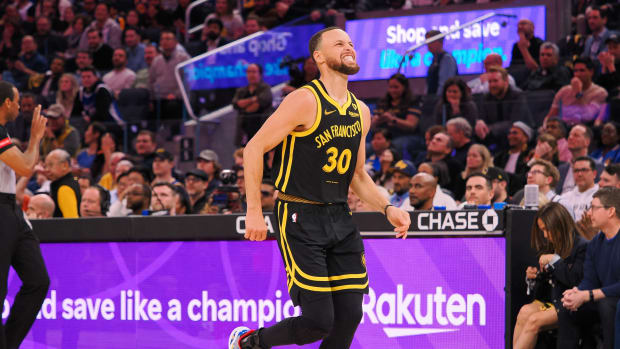Mavs Trade For John Collins? Why Dallas Should Say ‘No’
The Dallas Mavericks still are in the process of configuring the ideal supporting cast around Luka Doncic. As quickly as the emergence of Jalen Brunson occurred, his departure soon followed. What could the Mavs look to do without a secondary All-Star in place?
Among the various options that have been mentioned in both reporting and speculation for the Mavs is John Collins. The 6-foot-9 power forward is averaging 13.3 points, 8.1 rebounds, and 1.4 blocks while shooting 50.3 percent from the floor and 23.1 percent from 3-point range. He is playing in the second year of a five-year, $125 million contract, and the Atlanta Hawks have made him available ahead of the trade deadline.
According to Sam Amick of The Athletic, the asking price for Collins has "declined significantly." The Hawks are reportedly asking for just a quality player in return for Collins and not a first-round pick in some negotiations. Should the Mavs pursue a potential trade for him?
There is no denying Collins' ability to finish at the rim. About 49.0 percent of his shots come at the rim, and he produces 1.521 points per possession. He ranks ninth in efficiency in these situations among 119 players with at least 150 attempts at the rim. Considering he isn't a 7-footer, that's impressive. However, there's more to consider.
There may not be an active superstar that received more extreme game-planning efforts than Luka Doncic. Most playoff matchups will not feature a basic drop coverage defense that he can shred apart with pick-and-roll after pick-and-roll. in these situations, Collins' value diminishes.
As teams around the NBA become more aggressive in deploying defensive switching schemes, the value of a play finisher diminishes. The opportunities for Collins to slip a ball screen to get behind the defense for a lob become reduced. It becomes a matter of being able to exploit mismatches and being a threat to attack closeouts as a supporting cast talent.
Against the Miami Heat's switch-heavy defense in last year's playoffs, Collins was limited to averaging 9.4 points and 4.6 rebounds in 24.4 minutes per game. He did so on .487/.367/.500 shooting splits. He was involved in a total of five roll man possessions and spent most of his time spacing the floor or cutting when there were opportunistic chances to do so.
The only opportunities that Collins received in the playoff' series against the Heat to make a play as a screener was to serve as a short roller after Trae Young was blitzed. The results were ugly. He scored a total of three points in these particular situations.
The Hawks utilized Collins in the post during just five possessions in a whole five game playoff series. He didn't log a single isolation play. He was essentially rendered obsolete by the Heat's aggressive defensive approach. While Young was being overburdened, Collins was just another guy in the offense. For Doncic, having shooting threats is helpful to go five-out, but presently, there are concerns with his impact in such situations.
Collins has spent most of his possessions within the half-court this season spacing out for spot-up opportunities. He's generating a poor 0.698 points per possession in those situations — the worst among all NBA players with at least 80 attempts. He's not converting consistently on catch-and-shoot looks and struggles to execute in attacking closeouts, often forcing a drive right.
More often than not, Collins' involvement in spot-up plays involved inaccurate 3-point shooting on open looks coupled with awkward sequences where he appears to be over attacking due to a loss in confidence. These are the types of outcomes that induce migraines when watching heliocentric offense.
Other times, Collins looks like a fluid option that can get into the paint for a right-handed hook over a smaller defender after drawing help on a closeout attack. He is capable of making these plays, but the data shows that he has been severely inconsistent in doing so.
In terms of countering switching, Collins can do some damage when taking a smaller player into the post. He can get to his right hand for a jump hook and is a capable threat using a face-up jumper, or turning middle to shoot over the top. However, he has less size and operates less efficiently in the post than Christian Wood, making it easier for the opposition to go small. Regardless, he's not a go-to scoring threat by any means.
In terms of Collins' role defensively, he fits the mold of being a "tweener" frontcourt player. He doesn't have the physical tools to be a rim protector in terms of height, length, or quickness. He's also limited in the lateral quickness department, limiting him when guarding out in space.
When attempting to guard out in space, Collins is often conceding a jump shot or getting blown by. Again, he's limited in sliding his feet laterally, requiring him to often have help rotations from his teammates to help cover up his deficiencies in those situations.
The Mavs take pride in executing scramble plays defensively. Collins' lack of mobility makes him a liability when it comes to containing a drive after making a closeout, whether he is already home on the shooter, or has to fly around in the half-court to make a rotation. If there isn't a high level rim protector with foot speed next to him, it becomes a problem.
In speaking of rim protection, Collins doesn't provide a positive impact in that department, either. As previously noted, he's limited in how he can vertically pressure when trying to wall up a drive. He lacks much of an impact when rotating as the low man, or generally making a help rotation.
The goal for fielding a supporting cast around Doncic should be to make things easier for him on both ends, even against switching and blitzing teams. Does Collins help offensively? Probably not. Defensively, things would become even more challenging. Given the financial risk of long-term salary, such a move doesn't seem to be the right one to make.
A simple rule of thumb should be to observe why success isn't occurring for a player in their present situation. The Hawks are led by a high usage star in Young who runs a high volume of pick-and-rolls and isolation in addition to having a secondary All-Star like Dejounte Murray. As a play-finisher, Collins isn't consistently getting it done and is not an impact player defensively.
There will be other options available to the Mavs at the trade deadline and in the upcoming offseason. The team isn't in a position to take on more bad contracts of limited players. Making a move for Collins would be just yet another move of that nature.
Want the latest in breaking news and insider information on the Dallas Mavericks? Click Here.


